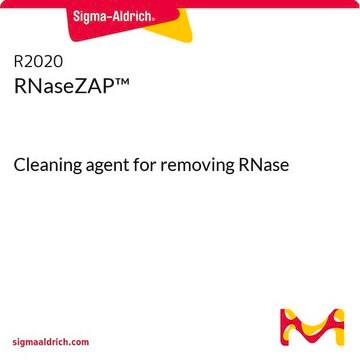W1754
Water
PCR Reagent, suitable for PCR
Synonym(s):
H2O
About This Item
Recommended Products
product name
Water, PCR Reagent
grade
PCR Reagent
vapor density
<1 (vs air)
vapor pressure
3 mmHg
sterility
sterile-filtered
form
liquid
packaging
vial of 1.5 mL
technique(s)
PCR: suitable
refractive index
n20/D 1.34 (lit.)
pH
5-7
bp
100 °C (lit.)
mp
0 °C (lit.)
density
1.000 g/mL at 3.98 °C (lit.)
foreign activity
DNase, none detected
RNase, none detected
SMILES string
O
InChI
1S/H2O/h1H2
InChI key
XLYOFNOQVPJJNP-UHFFFAOYSA-N
Looking for similar products? Visit Product Comparison Guide
Related Categories
General description
Application
- as a component of the reaction mixture and as a diluting agent in microfluidic RT-qPCR
- as a component of the reaction mixture for the amplification of products from fungal (Trametes versicolor) DNA
- as a diluting agent and as a component of the reaction mixture for the amplification of cDNA
- Water has been used to make up the final volume of the sample in polymerase chain reaction (PCR)
Suitability
Other Notes
Storage Class Code
12 - Non Combustible Liquids
WGK
nwg
Flash Point(F)
Not applicable
Flash Point(C)
Not applicable
Personal Protective Equipment
Certificates of Analysis (COA)
Search for Certificates of Analysis (COA) by entering the products Lot/Batch Number. Lot and Batch Numbers can be found on a product’s label following the words ‘Lot’ or ‘Batch’.
Already Own This Product?
Find documentation for the products that you have recently purchased in the Document Library.
Customers Also Viewed
Articles
Small interfering RNAs (siRNAs) are powerful tools for gene expression knockdown, widely used in molecular biology.
Small interfering RNAs (siRNAs) are powerful tools for gene expression knockdown, widely used in molecular biology.
Small interfering RNAs (siRNAs) are powerful tools for gene expression knockdown, widely used in molecular biology.
Small interfering RNAs (siRNAs) are powerful tools for gene expression knockdown, widely used in molecular biology.
Protocols
Hot start dNTP protocol enhances specificity in PCR by blocking DNA polymerase nucleotide incorporation during PCR.
Hot start dNTP protocol enhances specificity in PCR by blocking DNA polymerase nucleotide incorporation during PCR.
Hot start dNTP protocol enhances specificity in PCR by blocking DNA polymerase nucleotide incorporation during PCR.
Protocol describes amplification of DNA through quantitative PCR with SYBR Green. Consistent batch-to-batch performance can be achieved with large numbers of PCR reactions.
Our team of scientists has experience in all areas of research including Life Science, Material Science, Chemical Synthesis, Chromatography, Analytical and many others.
Contact Technical Service
![Water, PCR Grade liquid, pkg of 25 mL (03315959001 [1 x 25 ml]), pkg of 25 mL (03315932001 [25 x 1 ml]), pkg of 100 mL (03315843001 [4 x 25 ml])](/deepweb/assets/sigmaaldrich/product/images/326/208/bac83eed-3c88-4738-b4b5-50d3b223dd1c/640/bac83eed-3c88-4738-b4b5-50d3b223dd1c.jpg)



